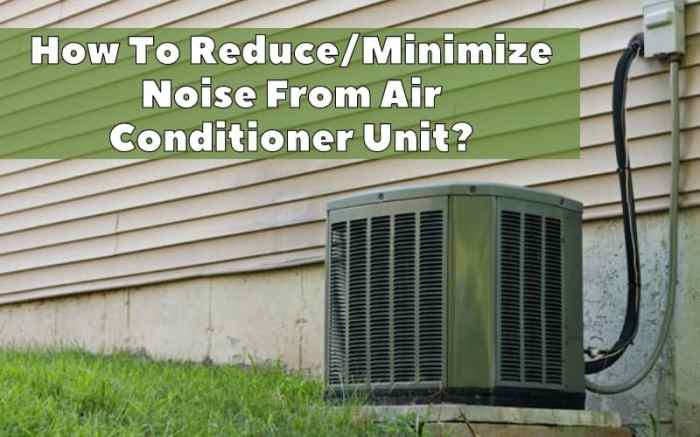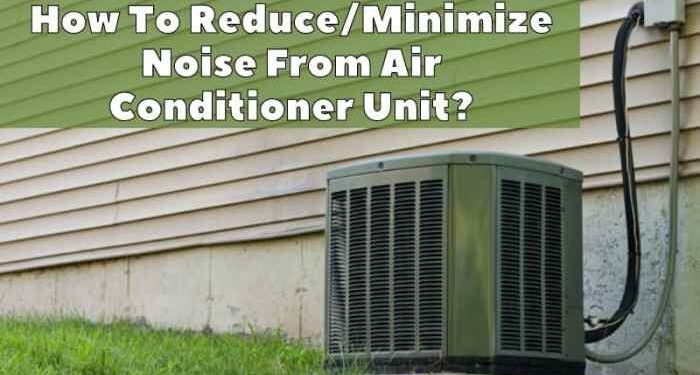When it comes to dealing with a noisy air conditioning unit, finding effective solutions is key. From understanding the root causes of the noise to exploring DIY methods and professional help, this guide covers it all. Let's dive in and discover how you can enjoy a quieter and more peaceful environment in your home or office.
Understanding the Causes of Noise from Air Conditioning Units
Noise from air conditioning units can be attributed to various factors, including the following common sources:
Design of the Unit
The design of the air conditioning unit plays a significant role in the amount of noise it produces. Units with poor insulation or inadequate soundproofing are more likely to generate higher levels of noise compared to units designed with noise reduction features.
Age and Maintenance
As air conditioning units age, components can wear out or become loose, leading to increased noise levels. Regular maintenance, such as cleaning filters, lubricating moving parts, and tightening screws, can help reduce noise levels and ensure the unit operates more quietly.
Strategies for Reducing Noise from Air Conditioning Units

Regular maintenance plays a crucial role in reducing noise levels from air conditioning units. Ensuring that all components are clean, lubricated, and in good condition can significantly decrease the noise produced by the unit.
Soundproofing the Unit or Surroundings
- Install soundproofing material around the air conditioning unit to absorb and block noise vibrations.
- Place rubber pads or anti-vibration mounts under the unit to reduce noise transmission to the floor or walls.
- Consider adding a sound barrier or fence around the unit to deflect noise away from your living space.
Impact of Location on Noise Levels
- Choose a strategic location for your air conditioning unit away from bedrooms or living areas to minimize noise disruption.
- Ensure proper installation with enough clearance around the unit to prevent vibrations and echoes that can amplify noise.
- Consider landscaping or adding vegetation around the unit to act as a natural sound buffer.
DIY Methods to Quiet an Air Conditioning Unit
When it comes to reducing the noise from your air conditioning unit, there are several do-it-yourself methods that you can try. These methods range from simple cleaning techniques to more advanced solutions like building a soundproofing enclosure.
Cleaning the Unit to Reduce Noise
One of the first steps you can take to quiet your air conditioning unit is to ensure that it is clean and well-maintained. Dust and debris can build up inside the unit, causing it to work harder and produce more noise.
Here's a step-by-step guide to cleaning your AC unit:
- Turn off the power to the unit to prevent any accidents.
- Remove the outer casing of the unit to access the internal components.
- Use a vacuum with a brush attachment to gently clean the coils, fan blades, and other components.
- Check and clean or replace the air filters to improve airflow and reduce strain on the unit.
- Once cleaned, reassemble the unit and turn the power back on to test for noise reduction.
Adding Vibration Pads or Rubber Feet
Another simple DIY solution to reduce noise from your air conditioning unit is to add vibration pads or rubber feet. These accessories can help dampen the vibrations produced by the unit, reducing the overall noise level
- Turn off the power to the unit and locate the contact points where the unit meets the ground.
- Place vibration pads or rubber feet under these contact points to create a buffer between the unit and the ground.
- Ensure that the unit is stable and level before turning the power back on to test for noise reduction.
Building a Soundproofing Enclosure
For those looking for a more advanced DIY solution, building a soundproofing enclosure around your air conditioning unit can significantly reduce noise levels. This enclosure can be made from materials like soundproofing foam, plywood, or acoustic panels. Here's how you can build a soundproofing enclosure:
- Measure the dimensions of your air conditioning unit and determine the size of the enclosure needed.
- Construct a frame using plywood or other sturdy materials to support the soundproofing materials.
- Line the inside of the frame with soundproofing foam, acoustic panels, or other noise-reducing materials.
- Place the enclosure around the air conditioning unit, ensuring that there is enough ventilation for proper airflow.
- Test the unit with the enclosure in place to see the difference in noise levels.
Hiring Professionals for Noise Reduction
When the noise from your air conditioning unit becomes too loud or disruptive, it may be necessary to seek the help of professionals for noise reduction. While some DIY methods can be effective, certain noise issues may require expert intervention to resolve effectively.
Types of Professionals for Noise Reduction
- HVAC Technicians: These professionals specialize in heating, ventilation, and air conditioning systems and can diagnose and repair any mechanical issues causing noise in your AC unit.
- Acoustical Consultants: These experts can assess the noise levels in your home, identify the sources of the noise, and recommend solutions to reduce or eliminate it.
- Soundproofing Contractors: If the noise is coming from the structure of your home or inadequate insulation, soundproofing contractors can help improve the acoustics of your space.
Costs Associated with Hiring Experts
The costs of hiring professionals for noise reduction can vary depending on the extent of the issue, the type of professional required, and the specific solutions needed.
- HVAC Technicians: The cost of hiring an HVAC technician for noise issues can range from $75 to $150 per hour, plus the cost of any replacement parts needed for repairs.
- Acoustical Consultants: Acoustical consultation services may cost between $500 to $2,000, depending on the complexity of the assessment and recommendations provided.
- Soundproofing Contractors: Soundproofing projects can vary significantly in cost, with an average range of $1,000 to $5,000 or more, depending on the size of the space and the materials used.
Final Thoughts
In conclusion, reducing noise from your air conditioning unit is not only possible but also essential for a comfortable living or working space. By following the strategies Artikeld in this guide, you can say goodbye to disruptive sounds and hello to a quieter, more serene atmosphere.
Implement these tips today and experience the difference for yourself.
Essential Questionnaire
How often should I clean my air conditioning unit to reduce noise?
It's recommended to clean your unit at least once a year to prevent dust and debris buildup that can contribute to noise.
Can adding vibration pads really help in reducing noise from the air conditioning unit?
Yes, vibration pads can absorb the vibrations produced by the unit, leading to a quieter operation overall.
When should I consider hiring a professional for noise reduction?
If DIY methods fail to sufficiently reduce the noise or if the issue seems complex, it's advisable to seek professional help to address the problem effectively.











